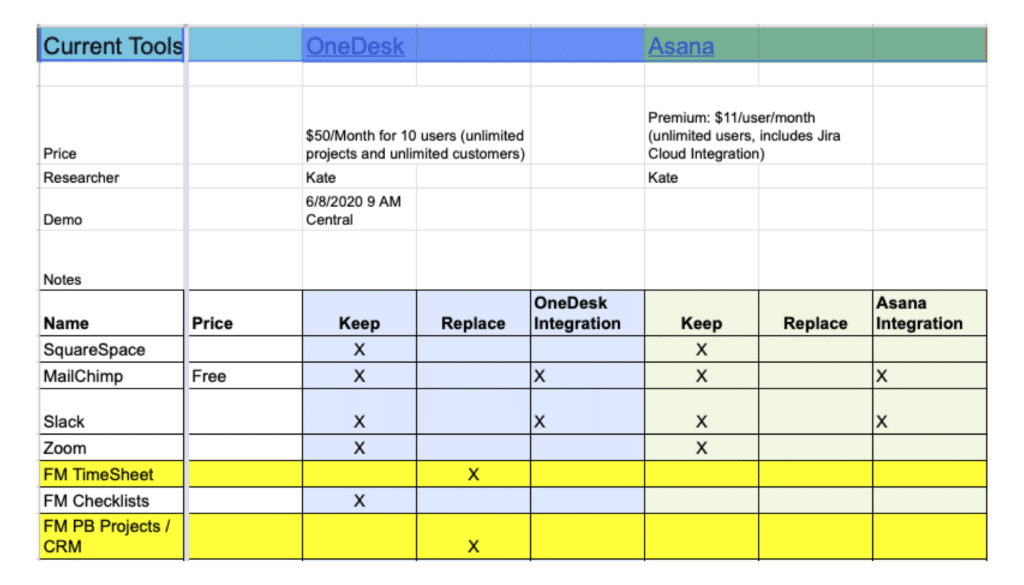Is Portage Bay a software development company that does project management? Or a project management company that happens to do custom FileMaker and 4th Dimension work? Interesting question. I often feel that our success as developers has as much to do with our skills in communications and project management than in the nitty gritty of writing code.
For many years, we’ve used an ad hoc collection of tools, both commercial and home grown, to manage our projects:
-
FogBugz for managing support tickets and for release management for a small number of projects
-
Trello for project managing most of our development work
-
A homegrown FileMaker app for time tracking
-
Google calendars for date related task management
-
Google Docs for a wide variety of chores
This collection of tools has served us reasonably well, but earlier this year with the hire of two new developers, I’d come to feel we’d really outgrown these disconnected apps and that we needed something that would allow us to manage the two types of projects that we used FogBugz and Trello for, as well as to take over from Fogbugz to handle support ticketing. One of the initial main goals was to have a single point of time tracking. We were long overdue for a system that allowed us to log time on all tasks into a single system that drove our final time reporting and invoicing.
As FileMaker developers, the desire to design and implement our own system can be strong. It is difficult to find software that works exactly as you would like it to right out of the box. However, development of a system to handle all the requirements we would demand of it, although completely possible with FileMaker, would be a big project in and of itself and would require ongoing maintenance and updating over time. We asked ourselves the same question we often ask our customers – do you really need a custom solution?
This led us to consider the wide range of project management solutions currently on the market in order to take advantage of an existing product that included as many features as we needed for our business needs. We made a list of our must-haves and nice-to-haves and started looking to see which products were currently on the market. Below is a partial list of requirements we considered:
-
Better UI: More modern interface, ways to view projects in Kanban board style as well as list all tasks in a project
-
Exports: Ability to export data (timesheet, project tasks, etc.)
-
Reports: Need to see billable hours by project and client and team member
-
Milestones/Version Control: Ability to manage release notes
-
Estimate Time Tracking: Need to tightly track actual time entry and estimates
-
Enhanced Workflow/Designer Tester Assignments: Nice to be able to assign a tester and developer and setup workflow to assign based on role
-
Different Views for Different Users: Customers versus Developers
-
Accounting System Replacement: eventually moving to QuickBooks Online or Freshbooks
-
Help Desk: Ability to email support tickets, including multiple support email addresses
In our search, we considered these products: Jira, Onedesk, Topdesk, Asana, Fresh Service, Proofhub, Teamwork with Teamwork Desk. Evaluating these seven options was a large task and we used a detailed spreadsheet and shared Google Doc to track our notes and progress. We also evaluated aspects such as customer support, price, and how well the tool would integrate with our existing business tools as we analyzed each option.

Making Our Decision
Jira is very sophisticated, and designed for large scale enterprise developers, but it also seemed to require 3rd party add-ons for practically everything we wanted to do. It was also difficult to reach them to get sales questions answered. Onedesk was a close contender as it is full featured, and met most of our requirements, but the user interface was complex and somewhat confusing. The company is based out of Canada and the support was very good. Asana is a well known product, but it didn’t include some key components we needed such as milestone/version control and the ability to track estimated time and actual time. It seems Asana is built to serve large enterprise operations with multiple teams interacting together, which is not our use case. Proofhub was ruled out primarily because it did not include a help desk capability. Teamwork was not the least expensive, but not the most expensive. It would do everything we wanted it to do, though with some limitations. It includes an attractive, modern interface. The company is based out of Ireland and they were very responsive during the sales process.
In the end, we decided to go with Teamwork. We’re about two months into the migration process and are so far happy with our choice. We’ve determined that for our modest needs, we can use Teamwork to handle our support ticket needs without using Teamwork Desk, which resolves the main reservation we had about Teamwork in the first place – limitations of the time tracking capability in Teamwork Desk. Teamwork support continues to be responsive as we’ve had support requests and features requests sent in. In addition, the new system now gives us a global insight into what team members are working on and the ability to manage priorities globally. It includes a single place to view and manage due dates on tasks, Kanban board view or list view for each project, help desk ticketing, customized notifications, and a customer portal interface. It also includes an API, which would allow us to further customize and integrate the system with a FileMaker database should we choose to do so in the future.
Migration
Our migration process for moving all data into Teamwork from our other tools was also closely considered. Trello migration is easy since Teamwork has an import tool for importing Trello boards. This is not the case for Fogbugz and so that migration is going slower. We have written a simple FileMaker app to use the Fogbugz API to pull all of our support ticket history into a FileMaker app for historical reference. We may decide to use the Teamwork API to push that history into Teamwork, but at the moment we’re leaning against that extra effort.
Conclusion
By the end of October, our last two projects will be migrated out of Fogbugz and into Teamwork and we will be 100% in the new environment, though I think we will only just be getting started on re-working our business process to take maximum advantage of Teamwork’s capabilities. I’m excited about how it’s going and for the improvements I already see in our business.
